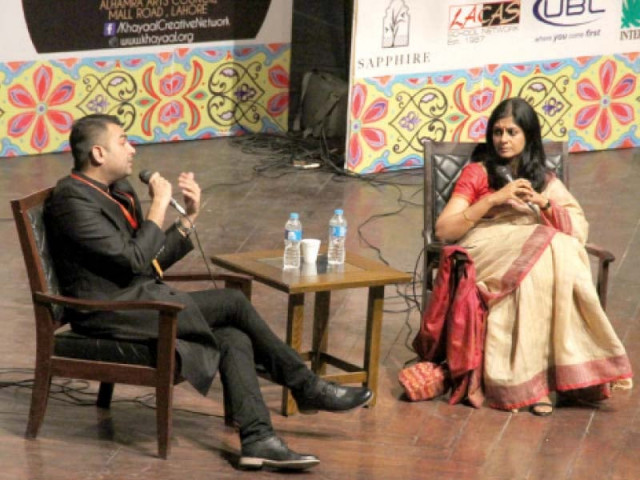Khayaal Festival 2015: Das, Khoosat talk about Manto’s life and works
Das is currently making a film on Manto’s life. Khoosat recently released a film about the writer

Sarmad Khoosat talks on Saturday to actress-director Nandita Das at the Khayaal Festival 2015. PHOTO: EXPRESS
“It took us almost 50 years to finally own Saadat Hasan Manto,” Sarmad Khoosat said on Saturday in a conversation with actress-director Nandita Das at Khayaal Festival 2015.
Das is currently making a film on Manto’s life. Khoosat recently released a film about the writer.
“The first time I came across Manto was when I saw a play based on one of his short stories in college,” said Das. She said the play prompted her to go to a bookshop near her college and buy a Hindi translation of Manto’s writings.
“I have not seen [Khoosat’s] film. It has been a conscious effort. I did not want it to impact my vision of a movie,” she said.
Khoosat’s Manto focuses on the writer’s life after partition of India. Das’s film is centred around his years in Mumbai. It will look at his life from 1945 to 1952.
“It is difficult to understand a person….how they think and feel. It was important for me to understand Manto, his relationship with his wife, the film industry and his friends,” she said.
She said that Manto had a certain arrogance about him. “Its meaning is not precisely conveyed in the popularly-understood connotation of the word. He was not in competition with anybody. He created an identity for himself even though he was not consciously trying to create one. He stood out simply because he was so different. For example, despite being one of the most progressive writers of the time, he was not part of the Progressive Writers’ Movement,” she said.
“I have tried to understand the vulnerabilities of someone like Manto, who was discriminated against. In trying to understand this, I have relied on research,” she said.
“The movie is a tribute to the mavericks of the world. When Manto wrote, he did not think he was being courageous. Unconsciously, however, he was probably aware of the retributive power of literature,” she said.
Khoosat also talked about his own interpretation of Manto. “When I was growing up, there was a lot of censorship, especially in my school days. We were kept away from some things because they were beyond our comfort zone,” he said.
Despite this censorship, he said, it was a generation that interacted with the world and came back looking for something to call their own. “It was in this search that they finally rediscovered and owned Manto,” he said.
Published in The Express Tribune, November 29th, 2015.



















COMMENTS
Comments are moderated and generally will be posted if they are on-topic and not abusive.
For more information, please see our Comments FAQ